Bunchō
Ippitsusai Bunchō (一筆斎文調, fl. 1755–1790) was a Japanese ukiyo-e artist, best known for his yakusha-e actor prints in narrow hosoban dimensions.[1] Bunchō and Katsukawa Shunshō are credited with having developed kabuki actor portraiture focuses on producing likenesses of the subjects, rather than stereotyped faces.[2]
Little is known about Bunchō's life. His birth surname was Mori, and he is believed to have studied painting under Ishikawa Yukimoto of the Kanō school.[1]
The earliest known works attributed to Bunchō are the illustrations to Hachimonji Jishō II's Eiga asobi nidai otoko (1755). Between 1766 and 1774 he made a large number of actor prints in the narrow vertical hosoban dimensions. In 1770 he produced the three-volume Ehon butai ōgi (絵本舞台扇, "Picture-book of Stage Fans") with Katsukawa Shunshō, which depicts the leading kabuki actors of the day on ōgi hand fans; Bunchō handled the onnagata—male actors who portray female characters.[1] It was popular and went through multiple printings.[3]
From 1769 he also made bijin-ga prints of female beauties that show the influence of Suzuki Harunobu.[1] These became his major subject, and in the An'ei era (1772–81) no actor prints of his are known.[3]
Bunchō's last known work was an e-goyomi picture calendar from 1790. He had few students, one of whom was Kishi Bunshō (1754–96).[1]
- Works by Ippitsusai Bunchō
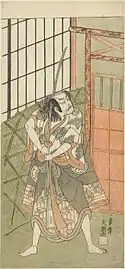 Matsumoto Koshiro III as Soga no Goro
Matsumoto Koshiro III as Soga no Goro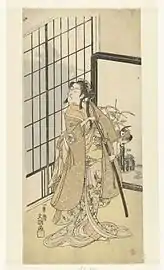 Matsumoto Koshiro as Asagao
Matsumoto Koshiro as Asagao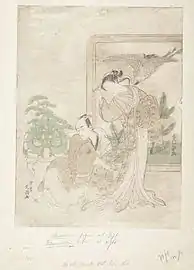 Actor and Courtesan Parodying the Armor-Pulling Scene from the Story of the Soga Brothers
Actor and Courtesan Parodying the Armor-Pulling Scene from the Story of the Soga Brothers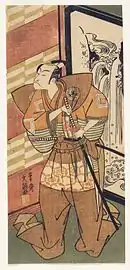 An Actor of the Ichikawa School about to Draw His Sword
An Actor of the Ichikawa School about to Draw His Sword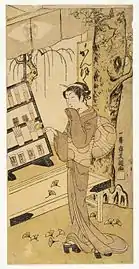 The Toothbrush Shop Yanagi-ya
The Toothbrush Shop Yanagi-ya.jpg.webp) Ichimura Uzaemon IX and Otani Hiroji III
Ichimura Uzaemon IX and Otani Hiroji III.jpg.webp) Ichimura Uzaemon X
Ichimura Uzaemon X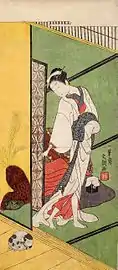 Courtesan with a Dog
Courtesan with a Dog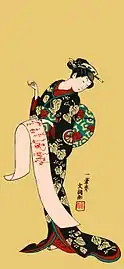
References
- Marks 2012, p. 48.
- Japan Ukiyo-e Association 1982, p. 120.
- Fujisawa 2006, p. 48.
Works cited
- Fujisawa, Akane (2006). "Ippitsusai Bunchō". In Kobayashi, Tadashi (ed.). Ukiyo eshi retsuden 浮世絵師列伝. Bessatsu Taiyō (in Japanese). Heibonsha. pp. 48–49. ISBN 9784582944938.
- Japan Ukiyo-e Association (1982). Genshoku Ukiyo-e Dai-Hyakka Jiten 原色 浮世絵大百科事典 第6巻 [Original Colour Grand Ukiyo-e Encyclopaedia]. Vol. 6. Taishūkan Publishing.
- Marks, Andreas (2012). Japanese Woodblock Prints: Artists, Publishers and Masterworks: 1680–1900. Tuttle Publishing. ISBN 978-1-4629-0599-7.
External links
 Media related to Ippitsusai Bunchō at Wikimedia Commons
Media related to Ippitsusai Bunchō at Wikimedia Commons- Ippitsusai Bunchō at ukiyo-e.org
